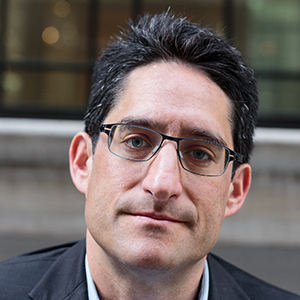The Benjamin von Sternenfels Rosenthal Grant for Mental Health Investigative Journalism

“The stories this fellowship supports should shine a light on mental illness and expose issues that can lead to understanding and solutions for a problem that has, for too long, been kept in the shadows.”
- von Sternenfels and Rosenthal families
The Benjamin von Sternenfels Rosenthal Grant was launched in 2020 by the Rosalynn Carter Fellowships for Mental Health Journalism in partnership with Reveal from The Center of Investigative Reporting. The award honors Ben von Sternenfels Rosenthal, a writer, athlete, devoted son, brother and friend to many from the San Francisco Bay area. He took his life in August 2019.
The journalist awarded this grant joins a talented cohort of Carter fellows from the United States and abroad tackling some of society’s biggest mental health challenges through their fellowship projects.
The grant is awarded annually to a gifted journalist who proposes an in-depth investigation into a mental health topic of their choice. The grantee’s project aims to hold a powerful person, institution or government actor accountable for harm or injustice related to mental health or substance use.
With this grant, the Rosenthal and von Sternenfels families support powerful stories that help dismantle stereotypes, remove stigma and humanize those who live with mental illnesses. They strongly believe that stories can be transformative, that stories told well and deeply-reported can create understanding and empathy.
The gift that launched this grant was donated to The Carter Center’s Rosalynn Carter Fellowships for Mental Health Journalism by Ben’s father and Center for Investigative Reporting board member Robert Rosenthal; Ben’s siblings, Adam and Ariella Rosenthal, and Ben’s mother, Inka v. Sternenfels.
Benjamin von Sternenfels Rosenthal April 12, 1993 - August 19, 2019
Benjamin von Sternenfels Rosenthal was a writer, elite athlete, devoted son, brother, and friend to many. His loved ones called him “Bimmy” or “Bim.” Ben had no tolerance for bullies and was acutely sensitive to inequities and the struggles of others.
As he navigated living with a mental illness, Ben leaned on his gift for writing with sharpness and humor by penning fiction, short stories, essays, screenplays and a novel. It is where he found peace and respite from anguish. He rarely shared what he wrote.
In the weeks leading up to August 19, 2019, when Ben took his life, he wrote a great deal. After Ben died, his family found a trove of his writing—his final words gifts for those who loved him. They were words not of anger and pain. But of understanding, grace, serenity and love.
Ben is survived by his mother, Inka v. Sternenfels; his brother Adam; sister, Ariella; father Robert and many cousins, aunts, uncles and friends.
This button will take you to cartercenter.org. To donate to this grant, select “Rosenthal Mental Health Investigative Journalism Fellowship” under the “Gift Purpose” dropdown menu.

“It is hard to imagine what it is like for the individual who suffers and struggles with mental illness. For the families and those who love those individuals there is also a terrible and endless struggle.”
- von Sternenfels Rosenthal families
Read more about Ben, in his family’s words
The Benjamin von Sternenfels Rosenthal Grantee - 2024-2024 Eli Cahan
Eli Cahan
Eli Cahan MD, MS is the Benjamin Von Sternenfels Rosenthal Grantee for Mental Health Investigative Journalism. He is an award-winning investigative journalist covering the intersection of child welfare and social justice. His written work has been featured in The Washington Post, Los Angeles Times, Rolling Stone, and USA Today, among other publications. His multimedia work has appeared on TV via ABC and radio via NPR. Cahan’s reporting has won awards from the National Press Club and the News Leaders Association. He has received reporting fellowships from The McGraw Center, The National Press Foundation, and The Dart Center. He has also been a grantee of the Fund for Investigative Journalism and The Pulitzer Center. Cahan is also a pediatrician at Boston Children’s Hospital and Harvard Medical School. He has published nearly two dozen studies and been featured in NEJM, JAMA, BMJ, and Health Affairs. He is Journalist-in-Residence at Harvard’s T.H. Chan School of Public Health, the associate director for the Health Equity Media Fellowship at Stanford School of Medicine, and a health communication advisor for the National Academy of Medicine.
Topic
As rates of eating disorders have skyrocketed, health care facilities devoted to treatment have proliferated. This investigation will examine increasing concerns about patients’ ability to access quality care.
The Benjamin von Sternenfels Rosenthal Grantee - 2023-2024 Evey Wilson Wetherbee
Evey Wilson Wetherbee
Benjamin Von Sternenfels Rosenthal Grantee for Mental Health Investigative Journalism
Evey Wilson Wetherbee is an Assistant Professor of Practice in Journalism at Mercer University. Prior to this, she worked as a producer at the Pulitzer Center in Washington, D.C. and freelanced for publications like the New Yorker, ProPublica, WABE, and Instagram. She now works as an educator and continues to report as a Journalist in Residence at Mercer University, often working with their partner publications and newsrooms including the Macon Telegraph, Macon Newsroom, WMAZ, and Georgia Public Broadcasting. Wetherbee double majored in Journalism and Religion at the University of Georgia before becoming a full-time photojournalist for daily and weekly papers. She received her master’s at UNC-Chapel Hill as a Roy H. Park fellow at the Hussmann School of Journalism and Media. She was a finalist for the 2022 Livingston Award in local reporting for her investigative documentary, Saving Juliette, which chronicled one small town’s fight for clean water against the largest coal-burning power plant in the Western Hemisphere. This film screened in festivals nationally and was nominated for an Emmy. It is now available on PBS. Wetherbee’s latest project is a six-part investigative podcast called Prison Town. After a year of reporting, she uses one prison in South Georgia as a case study to explore systemic issues within the Georgia Department of Corrections.
Topic
The mental health crisis in Georgia’s prisons.
Advisors

Aaron Glantz
Aaron Glantz is senior investigations editor at NPR's California newsroom. He was previously a senior reporter at Reveal. Glantz is the author of "Homewreckers: How a Gang of Wall Street Kingpins, Hedge Fund Magnates, Crooked Banks, and Vulture Capitalists Suckered Millions Out of Their Homes and Demolished the American Dream." Glantz produces journalism with impact. His work has sparked more than a dozen congressional hearings, numerous laws and criminal probes by the Drug Enforcement Administration, FBI, Pentagon and Federal Trade Commission. A two-time Peabody Award winner, finalist for the Pulitzer Prize, multiple Emmy Award nominee and former John S. Knight journalism fellow at Stanford University, Glantz has had his work appear in The New York Times, Chicago Tribune, NBC Nightly News, Good Morning America and PBS NewsHour. His previous books include "The War Comes Home" and "How America Lost Iraq."

Robert J. Rosenthal
Robert J. Rosenthal joined CIR as executive director in 2008, a position he held until 2017. Rosenthal worked for 22 years at The Philadelphia Inquirer, starting as a reporter and becoming its executive editor in 1998. He became managing editor of the San Francisco Chronicle in 2002. Before joining the Inquirer in 1979, Rosenthal worked as a reporter for The Boston Globe and The New York Times, where he was a news assistant on the foreign desk and an editorial assistant on the Pulitzer Prize-winning Pentagon Papers project. As a reporter, Rosenthal won numerous awards, including the Overseas Press Club Award for magazine writing, the Sigma Delta Chi Award for distinguished foreign correspondence and the National Association of Black Journalists Award for Third World Reporting. Rosenthal was a Pulitzer Prize judge four times and was a Pulitzer Prize finalist in international reporting.


